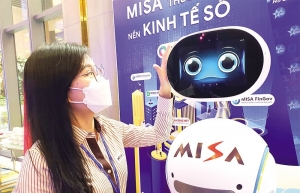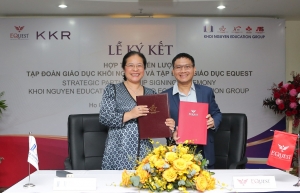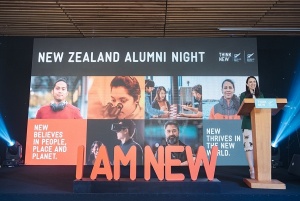Partnerships blossoming in education
EQuest Education Group last week announced that the group has scooped up the controlling stake in Khoi Nguyen Education Group (KNE). Following the deal, EQuest will become the key shareholder and join the Board of Directors.
 |
| Investors are attempting to make some educational establishments more prestigious and trusted, Photo: EQuest |
The two sides will share financial resources and best management practices while exchanging teaching resources, technology platforms, and development experiences from the top schools in the two systems. Additionally, students will have more access to training programmes.
Established in 2010, KNE is currently the owner of the Canadian International and Bilingual School System with four member schools in Ho Chi Minh City – Canadian International School, Bilingual Canadian International School, Albert Einstein School, and Canada-Vietnam Kindergarten. The whole system has more than 3,000 students and about 700 teachers and other staff.
Nguyen Quoc Toan, chairman and CEO of EQuest Education Group, said, “The primary goal of this strategic cooperation is to help transform these establishments into the most prestigious and most trusted international and bilingual school system in Ho Chi Minh City and the southern provinces.”
EQuest Education Group is one of the largest private educational institutions in Vietnam with more than 130,000 students in an ecosystem from K-12 to colleges, universities, and edtech across the country.
EQuest pulled an investment from global investment firm KKR on June 2021. The deal is part of KKR’s plan to triple investment in Vietnam in the next decade to capitalise on the rising demand and expanding middle class. In 2018, Singapore-based private equity company TAEL Partners also made an investment in EQuest.
Last month, Spark Education Group also announced a joint venture with Everest Education, a provider of premium offline and online education services in Vietnam. This partnership merges Everest’s online business with Spark Education’s proprietary technology platform and courseware.
Commenting on the entrance into the market, Wilson Li, CFO of Spark Education Group, said, “We are proud to enter into this partnership with Everest Education, who has already established a strong reputation among Vietnamese families for amazing international learning outcomes through their learning centres and online small classes. They will help us localise our global offering for the unique needs of Vietnamese students, and we look forward to empowering K12 students throughout the country together.”
Elsewhere in education, Thanh Thanh Cong Group in June completed the takeover of Yersin Da Lat University and Yersin High School. The acquisition marked TTC’s efforts to ramp up its investment in the education sector, and it intends to extend its school network to other cities and provinces across the country.
A number of Vietnamese edtech startups have also raised funding from foreign capital funds this year. Marathon Education bagged $5.1 million in a seed funding round led by New York-based Vulcan Capital. Another edtech startup, VUIHOC, raised $2 million in a bridge round led by Ant Group-backed venture capital firm BAce Capital.
Meanwhile, Azota, which allows teachers to create and grade online tests efficiently, has raised $2.4 million in a pre-series A round led by GGV Capital.
Le Xuan Dong, managing director of FiinGroup’s Market Research and Consulting Services, pointed out that there are three common market entry strategies in Vietnam’s education market: mergers and acquisitions, greenfield, and business collaboration. The local education market is attractive to investors as Vietnam boasts a young and growing population and increasing disposal income, as well as higher standard of living and spending on education.
“The Vietnamese government has offered incentives like favourable corporate income tax for the education sector as well as raised limits of local enrolments in foreign-invested schools to 50 per cent from previous 10-20 per cent,” he said.
However, there are still some challenges for the Vietnamese education market. “Specifically, the government has strict regulations on the establishment of a new educational institution in Vietnam like minimum required investment capital for each type of education institution and partnership, staff requirements. Another challenge is the lengthy and complicated licensing procedures in the education sector,” Dong added.
Binh Le Vandekerckove, founder and CEO of ASART Deal Advisory, said that education has been another of the highlights of cross-border agreements.
“The Vietnamese education market will continue to grow into the future. However, investors hope that there are more educational businesses so that they can make investments in Vietnam to capitalise on the strong purchasing power and consumption power,” he said.
 | Educators become more STEM-aware As digital transformation requires ever-higher technical qualifications, international cooperation is needed to develop well-rounded STEM education in Vietnam, along with more private sector infrastructure investment and career guidance, a workshop has heard. |
 | EQuest acquires controlling stake in Khoi Nguyen Education KKR-backed EQuest Education Group has acquired a controlling stake in Khoi Nguyen Education Group (KNE), the owner of four international schools in Ho Chi Minh City. A strategic cooperation agreement was signed under which EQuest became the key shareholder and joined the Board of Directors of KNE on December 2. |
 | New Zealand strengthens educational cooperation with Vietnam New Zealand Prime Minister Jacinda Ardern's visit to Vietnam from November 14 to 17, along with a trade and education delegation, highlighted the importance of bilateral cooperation in education between the two countries. |
What the stars mean:
★ Poor ★ ★ Promising ★★★ Good ★★★★ Very good ★★★★★ Exceptional
Related Contents
Latest News
More News
- A golden time to shine within ASEAN (February 19, 2026 | 20:22)
- Vietnam’s pivotal year for advancing sustainability (February 19, 2026 | 08:44)
- Strengthening the core role of industry and trade (February 19, 2026 | 08:35)
- Future orientations for healthcare improvements (February 19, 2026 | 08:29)
- Infrastructure orientations suitable for a new chapter (February 19, 2026 | 08:15)
- Innovation breakthroughs that can elevate the nation (February 19, 2026 | 08:08)
- ABB Robotics hosts SOMA Value Provider Conference in Vietnam (February 19, 2026 | 08:00)
- Entire financial sector steps firmly into a new spring (February 17, 2026 | 13:40)
- Digital security fundamental for better and faster decision-making (February 13, 2026 | 10:50)
- Aircraft makers urge out-the-box thinking (February 13, 2026 | 10:39)

 Tag:
Tag:


















 Mobile Version
Mobile Version